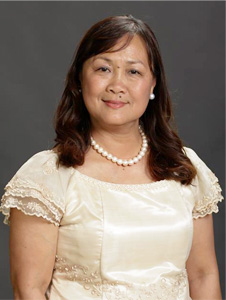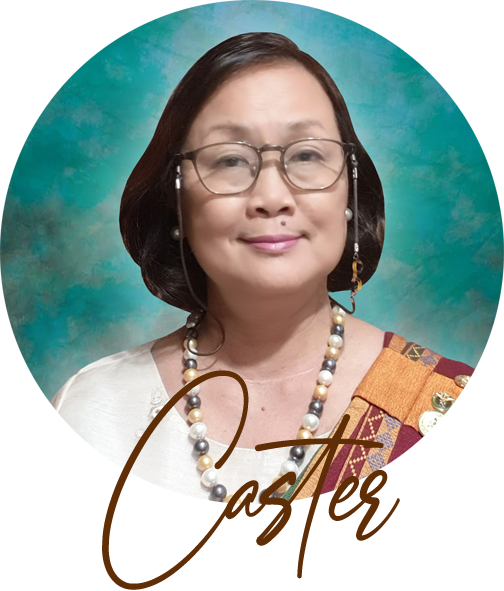My Personal Journey: No Destination But Excellence, Honor and Relevance
 Integrated scholarship and significant and sustained level of achievement: The journey. 37 years ago, I took the road least taken: I entered the professional world of public health. Today, I reflect on my journey as a nurse researcher – a journey that became the springboard of many expectations, achievements and challenges.
Integrated scholarship and significant and sustained level of achievement: The journey. 37 years ago, I took the road least taken: I entered the professional world of public health. Today, I reflect on my journey as a nurse researcher – a journey that became the springboard of many expectations, achievements and challenges.
I began as a community health nurse in the valleys and mountains in Northern Luzon where I was first introduced to the world of research, having been part of a national TB multi-drug regimen research. After five years of community health and development work, I went to take my masters at University of the Philippines Manila College of Public Health, where I learned the value of putting theory and practice together. Learning can be so meaningful with praxis. Fortunately, my hard work paid off. I landed 2nd among 100 multidisciplinary health professionals from Southeast Asia .
I joined the academe soon after my MPH. I took on the challenge given by Dr. Jesusa Lara, the Dean of Saint Louis University College of Nursing, who mentored me to teach research in the undergraduate nursing program. She also helped me develop my first research proposal in 1987. It was not only successful, it also landed me a spot at the CON, the Department of Research and Extension Services.
During my PhD at the University of Sydney, my research interest altered. I was introduced to the world of Qualitative Research and my life has never been the same. I came home with my PhD in 1995 and immediately started my crusade for Qualitative Research. I am happy to say that after almost 5 years of advocacy, my colleagues and I were successful. Now, I can say that Qualitative Research is here to stay. It makes me feel honored when people attribute the birth and growth of Qualitative Research in the Philippines, with my name, along with phenomenologist guru, Dr. Rozzanno Locsin. I focused on social critical theory, researches that were participatory and with immediate impact/use in the community/people I work with.
The first multidisciplinary research I conducted with my colleagues in 1997, joined by a historian, sociologist, anthropologist and a philosopher, Mainstreaming Indigenous Health Knowledge and Practices, was difficult but rewarding. It was the first multidisciplinary research in my University and had a book output in 2001 by the University of the Philippines Center for Integrative Studies.
My second book, Health Care Practice in Community came to fruition in 2003, followed by a Department of Health funded research, Perceived Health Consequences of Gender-Based KAP among Indigenous Peoples in the Cordillera Administrative Region, a publication utilizing a feminist framework and an extensive qualitative research that served as an input in the planning and delivery of the DOH’s health programs especially its maternal and child health programs.
I have not stopped conducting researches since then. I have sustained my “scholarship” as a nurse researcher and as a member of the interdisciplinary/ multidisciplinary team. This is hallmark of the two international collaborative researches that I conducted with the Australian national University [An Inter country study with the Philippines, Indonesia, Fiji, and South Africa: What is a just and justifiable measure of poverty that is genuinely gender sensitive and capable of revealing gender disparities?] and the study I collaborated with the University of Ottawa [Source Country Perspectives on the Migration of Highly Trained Health Personnel: Causes, Consequences and Responses (with researchers from the Philippines, India, Caribbean, South Africa, And Tanzania). I am among the few faculty members who have conducted international collaborative researches – a hallmark of my lifelong research journey.
In January 2008, the Philippine Nurses Association appointed my as the new editor-in-chief of the Philippine Journal of Nursing. Despite the problems with regularity of publication, I accepted and to date, I still am the editor-in-chief, with two regular internationally peer-reviewed and open-access issues a year and since 2014, indexed in the WHO-WPRIM, as well as in the APAMED Central.
There are more challenges, and for as long as the PNA accords me its trust and confidence, I will continue to bring the PJN to higher heights.
In the past two years, I and the PJN became a member of the Philippine Association of Medical Journal Editors and the Asia Pacific Association of Medical Editors. I am the only nurse and PJN is the only nursing journal member in PAMJE and APAME. Annually, with or without funding from the PNA, I attend meetings of the PAMJE and the APAME.
This year, the Philippines played host to the APAME. I was the only nurse editor/researcher who presented a paper, Mentored Peer Review as an Educational Tool, conducted among nurses who submitted manuscripts and how they perceived the mentoring peer review process that we gave adopted. It was a surprise that some editors of medical journals only realized then what a mentor peer review process meant.
As a nurse-researcher in a medical-dominated world of journal publishing, this made me proud. Another highlight of my journey is having founded the Philippine Nursing Research Society Inc. in 2008.
As founding president, I led the Society in research trainings, workshops and eight annual national nursing research conferences, including one International Qualitative Research Conference in Nursing and Health, with no other than Dr. Marilyn Ray as the Keynote Speaker. This was another opportunity to work with a mentor, who invited me to write a Chapter in the 2nd Edition of her book, Transcultural Caring Dynamics in Nursing and Health Care. The e-copy is expected to be out in February 2016. This is one of the greatest honors I have received in my entire life as a nurse researcher. Not only have I added a publication in my list, I am very proud to have been mentored by a nurse-theorist I admire.
Building blocks have for integrated scholarship have slowly been put in place, the journey from the novice community health nurse in the valleys and mountains to who, where and what I am today. The journey keeps on, steadfast and grounded.
Internal and External Funding Sources: The local and international collaborative researches were well funded. I have sourced financial resources to as low as P50,000.00 (Faculty Grant) to a P3 Million project as reflected in my CV. All these were properly used and audited.
Publications and Presentations as Evidences: My journey has led to several publications, some of which I have mentioned and which could be gleaned from my curriculum vitae. I wish to share that the article that appeared in the Signs: Journal of Women in Culture and Society 3 (Spring 2010), pp. 550-558 of the University of Chicago Press, was another honor. I was personally invited to submit a paper, corresponding to the theme of the issue.
I take pride of the other publications: book chapters; monographs; training modules/manuals; research articles in the Philippine Journal of Nursing. I also have travelled nationally and internationally to share my/our research outputs through podium, poster and symposium presentations including that of the STTI and other reputable organizers (USA, Canada, Norway, Japan, Australia, Thailand, Malaysia, Mongolia, China, Hong Kong, Indonesia, Bangladesh, Cambodia, Vietnam)
Learning with Mentees: I have not stopped learning. Every meeting with my students and advisees is a learning session. My students claim to feel my passion. They feel I value their work as I read and comment or make recommendations on their work – and I do.
I take pride to have advised the first PhD graduate of the SLU School of Nursing (2015) and to have worked with mentees who now are mentors and research coordinators in their respective organization. I was recognized by the Regional Winner for Luzon as the Best Mentor for Health Research, an award given by the Philippine Council of Health Research of the Department of Science and Technology in 2009. As an alumna, I was awarded Most Outstanding Alumni in Nursing Research in 1999; Top 50 Outstanding Alumni in 2007 and one of the 11 Outstanding Alumni in 2015 (3 nurses and 8 medical doctors), all because of a strong commitment to research.
Translations and Evidences of Work: My work in women’s health, gender and reproductive health has resulted in Gender Responsive and Rights Based Integrated RH Service Delivery: A Training Manual (Volume 1 and 2) for the Department of Health (National) and the research on the Health Consequences of Gender-Based Knowledge, Attitudes and Practices for the DOH (Regional) guided the delivery of services in the national and regional level of the DOH.
My faculty grant has contributed to curriculum enhancement. I take pride in having participated in developing the Individual Deprivation Measurement, now being tested and disseminated as an alternative tool in measuring poverty, a tool that nurses can utilized in assessing the needs of the community and developing their community diagnosis. The technical assistance for the updating and enhancement of the supervisory and leadership skills of Public Health Nurses with the DOH’s Human Resource and Development Bureau (HHRDB) and National Center for Disease Prevention and Control (NCDPC) and with the LGUs- PHOs and RHUs where participating Public Health Nurses came from, resulted in the publication of Resource Manual and Training Guide for Public Health Nurse on Supervision, including a training of trainers design and guide for follow up after training. The researches done with the IPs on their indigenous knowledge and practices are now being taught among the school children in line with propagating and valuing their roots and resources.
Indeed, a research journey that knows no destination but excellence, honor and relevance.
